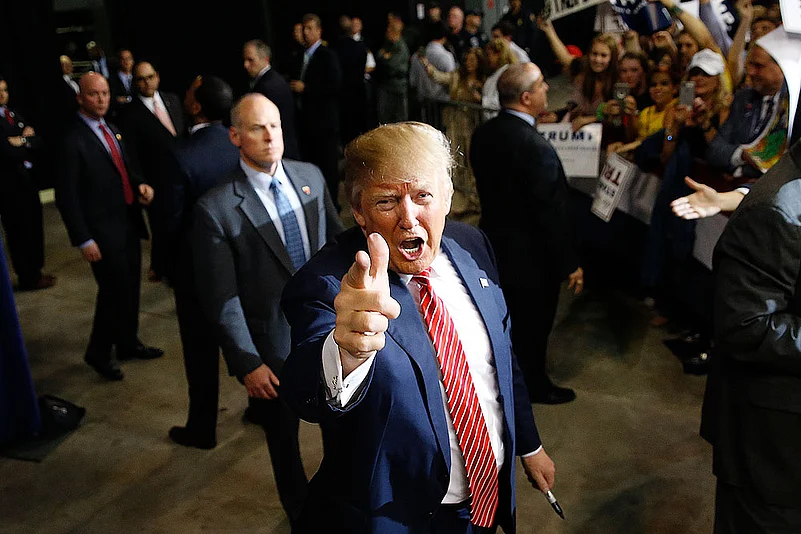Uncle Scram
Why everyone is scared of Trump
- Party: Republicans unsure how to handle the “outsider” as candidate. A new candidate now means suicide.
- Voters: His brash, less-than-presidential anti-Muslim straight talk has polarised public opinion across USA
- Country: He plans to build a wall on Mexican border, also to kill terrorists “and their families”
- World: Wants to end trade deals with China, bomb oilfields in West Asia and take on ISIS
- India: Sent a Sikh out of a rally; vows to cull the numbers of H-1B visas, which will hit techies
***
Art, it is often said, imitates life. And if it involves Donald Trump, one of the most polarising politicians you will see, even the most far-out, avant garde, post-modern piece will be believable. No wonder an episode of the ever-popular The Simpsons, depicting a dystopian future under a Trump presidency, is now threatening to go viral in the US and beyond. In less than a year’s time, since he girandoled on to the American political stage, Trump has attacked almost all sections of society barring his core, white-conservative constituency, his remarks often rankling America’s neighbours and allies. He has called Mexicans “rapists” and “criminals” and said he would build a 2,000-mile-long wall along the US’s southern border to keep out Mexican immigrants—and make Mexico pay for it. He has threatened to throw out all immigrants who are not registered, including their children born in the US, in gross violation of the country’s constitution, let alone granting them citizenship.
And in dealing with the terror threat, Trump has cast aside all moral constraints about torture and ‘collateral damage’. His is a language of retribution, and he delivers it with trademark braggadocio, to lusty cheers from a partisan crowd. Trump wants to take the war against ISIS to their homes by targeting their families—an announcement seen as advocating war crimes. Most notoriously, he has also called for a blanket ban on all Muslims entering the US. Frothing at the mouth, Trump has made disparaging remarks about women, mocked physical disability, thrown out protesters from his rally, insulted journalists and watched them being heckled with smug glee. As if to bolster his credentials, he has carried out a false campaign on President Barack Obama, challenging his birth on American soil and thus seeking his disqualification. And, in the heat of the acrimonious race for the Republican nomination for the 2016 polls, he has also attacked and insulted his fellow nominees, calling them names and accusing them of lying.
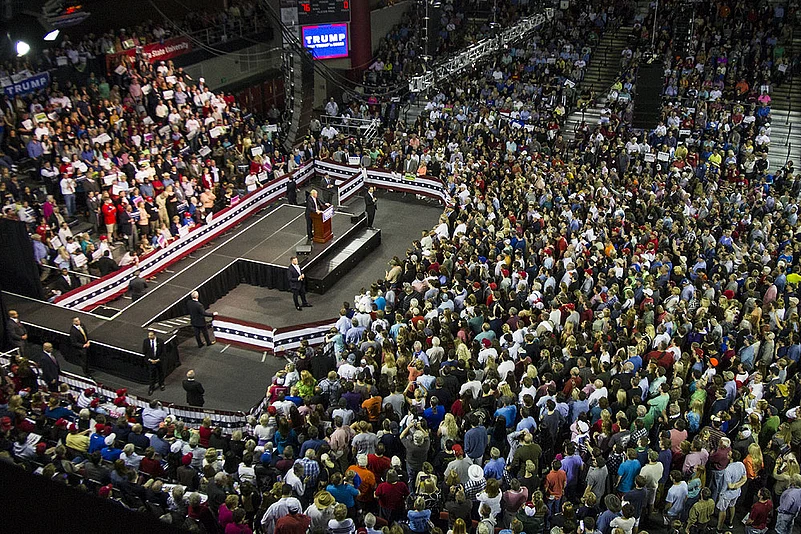
From The Pulpit Donald Trump speaks at Valdosta State University in Georgia. (Photograph by AFP, From Outlook Issue 21 March 2016)
Understandably, in anticipating life under a Trump presidency, The Simpsons episode, laced with sinister overtones, has generated a strong, emotional reaction among viewers. One character, Bart Simpson, gets a chance to look into the future and finds a country reeling under huge financial debts, ravaged by crime and dependent on its survival on Chinese and European aid only weeks after Trump vacates the White House. Though it was made in 2000, the episode, with several updates, is being given a new lease of life as a number of people, both within and outside America, are revisiting it as a what-if scenario in the event of a Trump victory which, they say, will be akin to living through a nightmare. In foretelling the future, the creators of The Simpsons have an impressive track record. Past episodes have predicted developments like the Arab Spring and the dangers of the Ebola virus. Many Americans believe that the outcome predicted in its Trump episode would materialise if the billionaire-turned-politician manages to wrangle the Republican nomination and, horror of horrors, goes on to win the election.
“As an Arab and a Muslim, I am frankly terrified by the prospect of a Trump presidency,” says Abdel Bari Atwan, the London-based editor of Rai-al-Youm, an Arab-world news and opinion website. “His campaign has been weighted towards the lowest common denominator, appealing to all that is worst in the American psyche...xenophobia, racism and violence.” According to Atwan, Trump would like to revive the ‘war of civilisations’, pitting the West against Muslims, towards whom he bears unbridled hostility. Indeed, his demands for a payback against ISIS is simply because they “kill Christians”. Such an approach “would impact on the peace and well-being of America’s own three-million strong Muslim population,” says Atwan.
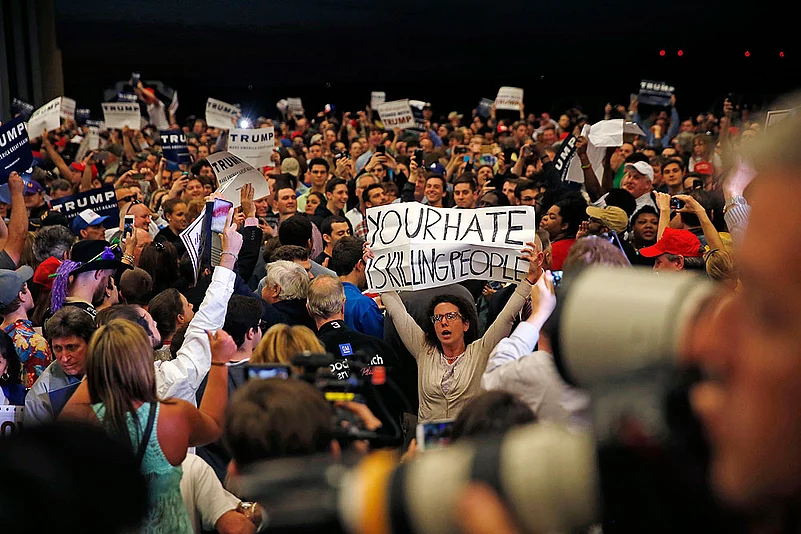
Voice Of America Protesters holding up placards at a Trump rally in New Orleans. (Photograph by AP)
But anger and concern at Trump’s intransigence is not only limited to his American detractors or concerned Muslims. Many of America’s allies in Europe and the NATO are equally worried about the prospect of Trump becoming the next US president.
After his announcement that, if elected, he would ban the entry Muslims, the British parliament met to discuss: “Is Donald Trump dangerous? Or is he merely a buffoon?” Some called him “daft and offensive”, others described him as a “ridiculous xenophobe”, but cutting across party lines, most MPs felt that Trump should not be allowed within “1,000 miles of our shores”, thus joining a large number of British petitioners who want a ban on his entry to Britain.
But how seriously should Trump be taken?
In mid-2015, when he swaggered into the crowded ring of Republican nomination hopefuls, nobody took him seriously. He had a 50-1 shot at winning the nomination. However, after his string of victories at the Republican caucuses, including seven of the 11 states on Super Tuesday, Trump is the front-runner by a long distance. He is also more popular than Ted Cruz and Marco Rubio—the only candidates standing who can challenge him—among all sections of voters: men, women, old, young, rich, poor, married, unmarried, evangelical, non-evangelical, those with college degrees and those without, whites and blacks. However, Hispanic voters—crucial for any win—detest him. His Michigan and Mississippi caucuses on Friday showed that his popularity was not likely to wane. Next week, he is also predicted to win Illinois.
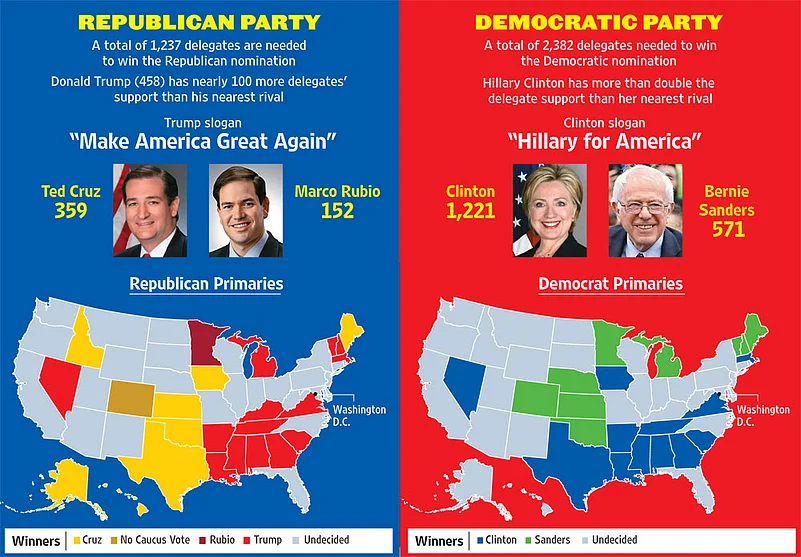
Against millions of liberals in the US and around the world who follow Trump with contempt and trepidation are ranged legions of Trump supporters, who find in him attributes that are often exaggerated and imaginary. His penchant of playing to the gallery obliges him to shift his stand on issues and out with offensive remarks—delivered with sneering aplomb—that he thinks his supporters want to hear. In what might seem perverse, the more stridently obnoxious he gets, the more his ratings go up. Many think Trump is honest and blunt enough to talk about issues like migration and joblessness, unlike others.
While many Trump admirers think the economy will be safe in his hands since he is a successful real estate tycoon, few are aware of his string of failed projects or the bad business sense that had led him to near-bankruptcy. His supporters also get taken in by his demagoguery and believe him when he threatens to sue people or claim that he has never settled a suit filed against him to deter others from pressurising him. The reality, in fact, is just the opposite.
But how does one explain the meteoric rise of someone who is a Republican Party outsider, someone, furthermore, who is even opposed by GOP heavyweights the more he shows his colours?
Political scientists differ on the Trump phenomenon. Some blame it on the Republicans for pursuing policies that dilute the party’s core principles, while others point out that Trump is the product of a rising authoritarian trend in the US over the past decades along with a rightward Republican shift.

Take That! Shenaz Treasurywala sends a personal taunt to the anti-immigrant Trump
“The Republicans are very much to blame,” says Marc Hetherington, a professor of political science at Vanderbilt University. “The thing that causes the more authoritarian to find the Republican party attractive over the years and the Democratic party unattractive is how Republicans chose issues.”
According to him, starting in the 1960s, when the GOP took its stand against the Civil Rights movement, Republicans have been reluctant to support anything that benefits non-traditional groups—feminists, immigrants, gays, lesbians and so forth. These inflexible positions, he says, are all attractive to supremacists in a population. “Being against minority groups or minority ideas is good politics; it helped Republican win elections for years. But it created a coalition of voters that the party can no longer control.”
Timothy Carney, political analyst of the Washington Examiner, says many of Trumps core supporters are “registered Democrat voters”. Many middle-aged white, rural Democrats are annoyed with the Democratic party. They like their guns, don’t favour gay marriage and feel the economy is doing horribly. Meanwhile, Obama tells them the economy is fine and Hillary Clinton has a record of supporting free trade and more immigration—their bugbears for low wages and high unemployment. Carney says, “Trump is tapping into a deep dissatisfaction among the US working class. His anti-immigration, anti-trade message provides a useful scapegoat to help explain to people why they’re suffering. Republicans and Democrats have ignored working-class white voters.”

Top Hope Hillary Clinton, with husband Bill and daughter Chelsea at the Iowa Caucus. (Photograph by AP)
Political scientist Charles Murray, however, has a more dismal theory built around Trump’s rise. “If you are dismayed by Trumpism, don’t kid yourself that it will fade away if he fails to win the Republican nomination,” he argues. He pointed out that Trumpism is a predictable expression of the ‘legitimate’ anger that many Americans feel about the course the country has taken. It is the endgame of a process that has been going on for a half-century: America’s divestment of its historic national identity.
So how should we in India look at a rampaging Donald J. Trump? The Atlantic pointed out that Hillary, who took twice as many trips to Pakistan as to India as secretary of state, worked hard to keep Pakistan under control. Trump, on the other hand, has declared Pakistan, “the most dangerous country in the world other than Iran”. Such a characterisation might soothe the Indian establishment, which is smarting at the Obama administration’s decision to sell F-16 fighter aircraft to Pakistan, especially at a time when India has suffered terror attacks emanating from across the border.
Many in South Block are in favour of a Republic US president, as they argue that India has benefited more under them—George W. Bush, for instance, went out of his way to seal the Indo-US nuclear deal.
But, for all the wild partisanship on display at his series of victory speeches, can Trump get the Republican nomination? Also what happens if he is denied a nomination by the GOP?
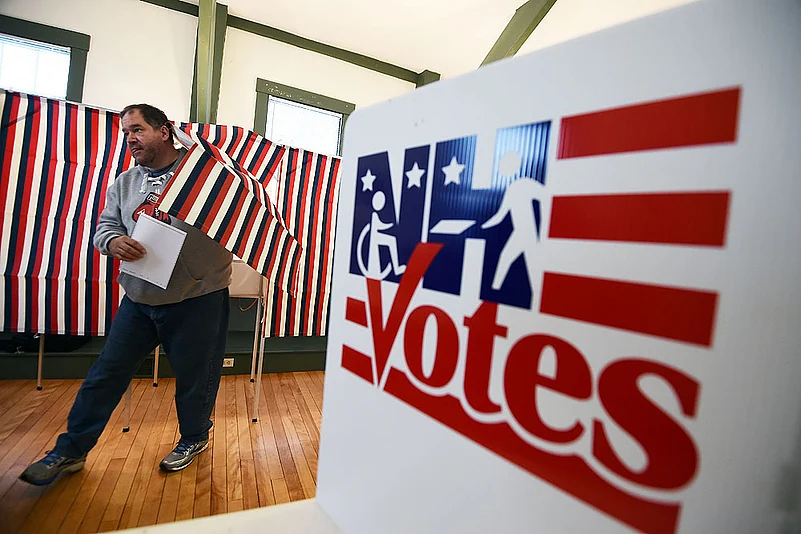
Day One A man at the first US presidential primary in Canterbury, New Hampshire. (Photograph by AFP, From Outlook Issue 14 March 2016)
There are two possibilities: One, despite Trump’s victory in a maximum number of party caucuses, the Republican establishment, which loathes him, refuses him a nomination. There is a strong possibility that Trump will then try and break the party and contest as an independent. This had happened in the past, when Theodore Roosevelt split from the party in 1912 and fought the election against party nominee Howard Taft. Or it might be a repeat of 1964, when a bitter fight between Barry Goldwater and Nelson Rockefeller split GOP supporters, and though the former won the party nomination, the cleft helped Democrat Lyndon B. Johnson win the election by a landslide. Thus, if rational Republicans disgusted with Trump’s dangerous bluster can’t stop his triumphal march to the nomination, many of them might just plump for a Democrat nominee like Hillary Clinton, currently in a tug of war with Bernie Sanders.
There is a third possibility that Duke University professor Peter Feaver points to. If the Republican party decides to go ahead with Trump and he also goes on to win, what happens? “Many things Trump proposes to do will be blocked by Congress. Others will be blocked legitimately by his own lawyers, or by others like military leaders obliged to resist illegal orders. Others will be blocked by our allies,” says Feaver. “I believe it will shock Trump and his supporters that the president is not all-powerful.”
But he also has serious concerns. “Yet, and this is what worries me the most, it is still the world’s most powerful political office and there is so much damage he will be able to do simply by mishandling the inherent powers of the office. As a consequence, he can still do substantial damage to our relations with allies.”
The world’s hopes rested on Trump’s falling at the first hurdle. As that increasingly seems unlikely, they are banking on a strong Democratic presidential nominee, and consensus seems to harden around the frontrunner, Hillary Clinton. For all her perceived drawbacks—a privileged background, a couple of dodgy issues in office—for most Americans she would remain the safest bet by the longest distance spanned by a US presidential poll in decades.
***
How Americans Vote
- Primaries: Primary elections are a six-month process in each state in which Democrats and Republicans choose nominees for the Presidency
- Caucuses: Caucus meetings are like primaries, except that the campaign processes are different and votes can sway their neighbours before voting
- Delegates: Delegates are picked by candidates from each state primary or caucus, depending on population and percentage of votes they receive
- Convention: Four-day convention of both parties in July to officially unveil their respective candidates before the general election on November 8
- Result: It will take 270 electoral votes to win the 2016 presidential elections. As of now, most polls show Democrats are about 25 votes ahead.


